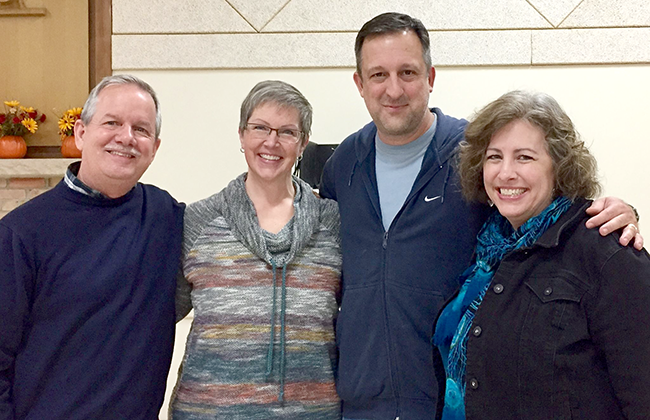How the process of Faithwalking inspired a new approach to ministry.
“Faithwalking started a whole different trajectory for how we think about doing ministry,” says Michael DeRuyter, lead pastor of Midland Reformed Church.
Faithwalking is a spiritual formation process to help people follow Jesus better, experience continual transformation, and live a more missional lifestyle. The process involves a series of retreats, leadership courses, and coaching sessions in which participants master the work of spiritual formation, inner healing, emotional maturity, and missional living. Faithwalking is a piece of Ridder Church Renewal, in which many churches in the Great Lakes Region are participating.
Midland was introduced to Faithwalking ten years ago when DeRuyter attended his first Faithwalking retreat.
“The reason it connected with me was the significant and immediate difference it made in my own life as a husband, a father, and a pastor,” he says.
In the decade since, nearly 60 people from eight congregations in the Midland area have participated in the process. Roughly half of those participants are members of Midland Reformed, the lone RCA congregation in the group.
One of those members, Katrina McCarron, has her own story. Her first Faithwalking retreat was in 2015. Then came a follow-up gathering the next year. And she has been a small group leader at another retreat. She admits she was initially hesitant about getting involved.
“I wanted to live an intentional life, but knew there were times when I resisted living in community,” she says. “I couldn’t explain why that was a struggle for me, but our pastor encouraged me to explore those areas through Faithwalking.”
Through the Faithwalking process, McCarron’s confidence has grown. Now she is forging her own path of living missionally by beginning a Bible study at the community college where she works.
“Faithwalking has allowed me to realize that I have my entire life to keep learning about myself, my relationship with God, and the impact he wants to make through me in our community,” she says.
As a result of the Faithwalking process, one member is mentoring a single mother. Other members are reconnecting with estranged children.
“There are stories of people who say they haven’t had a conversation like that with their spouse in two decades,” DeRuyter says of Faithwalking sessions on inner healing and emotional maturity. He says Faithwalking is one of the core tools he uses for discipling and building leaders: “I see my investment in coaching participants in the Faithwalking community as a primary ministry.”
Faithwalking, DeRuyter insists, is not merely an event or program.
“We’re empowering and equipping people to be the church where they spend the majority of their time, not expecting people to come to the church to have ministry done to or with them.”
McCarron heartily recommends Faithwalking: “Resist the self-talk that you don’t have the time, it’ll be too hard or things are just fine the way they are,” she says. “There are no words to describe the feelings you experience when you see the Holy Spirit at work in your life or someone else’s life. … I’m excited to see how the future unfolds.”





